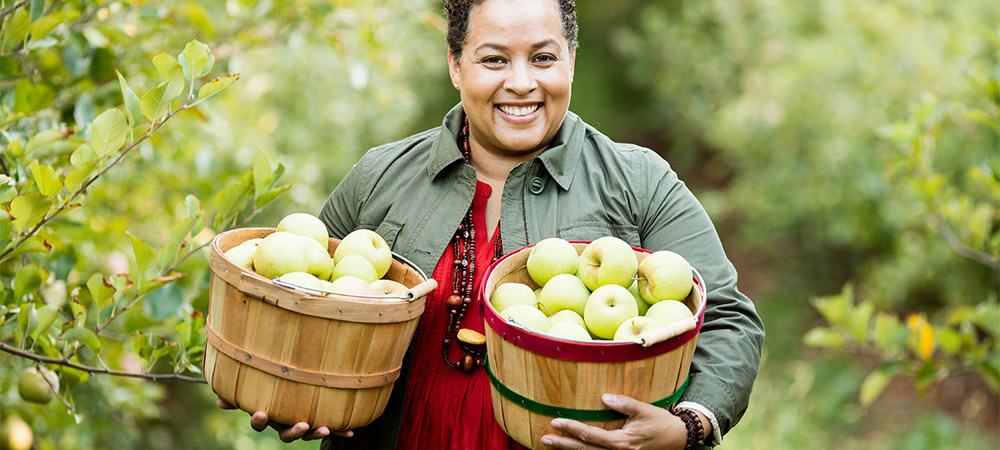We grow many popular varieties, including Ginger Gold, Gala, Red Delicious, Golden Delicious, Jonagold, Jonathan, Rome, Stayman, Winesap, York, Granny Smith, Fuji, and Pink Lady. Our apple harvest typically begins in late July and extends through mid-November.
Apple Profiles
Generally, tart apples are best for cooking, while sweeter apples are preferred for snacking and for salads. See the chart below for the flavor profile and uses for the varieties of apples available at our orchards.
{{ selectedOrchard }} Phone: {{ selectedOrchardPhone }}
Name Flavor Profile Good For {{ fruit.title }} {{ fruit.description }}N/A It looks like no fruit match that filter.
Try selecting a different orchard or fruit type.
Virginia Apple Facts
- Each year, Virginia produces an average of 8-10 million bushels of apples.
- Virginia apples are destined for markets in 15 states and more than 20 countries.
- 75% of apples grown in Virginia are sold for processing and made into popular products such as applesauce, apple juice, apple butter, slices, and cider.
- Local apple varieties require 90 to 175 growing days from spring bloom to fall harvest.
- Depending on the type of rootstock, 100 to 500 apple trees are planted to the acre.
- An Albemarle Pippin once made Queen Victoria swoon. No wonder it became the most coveted apple in the world!
Tips for Storing Apples
- Handle carefully. Bruised apples do not store well.
- Wash right before use. Not earlier.
- Refrigerate to prevent quick ripening. Apples ripen 8 to 10 times faster at room temperature.
- Cold apples = crisp apples.
- Prevent the flesh from turning brown by dipping peeled apples in lemon juice or saltwater.
- Pick the right storage companions. Apples produce ethylene gas which speeds up the ripening process for sensitive fruits and vegetables. For example, oranges, cucumbers, and blueberries are good storage companions; peaches, pears, and bananas are not.
- To prevent absorbing other food flavors, store in a ventilated plastic bag or crisper drawer set to low humidity.

Apple Nutrition Facts
An apple a day… Apples are one of the most versatile foods around. They are delicious as main meals, desserts, side dishes, or just for eating. Next time you reach for that bag of potato chips, grab an apple instead!
Not only are apples low in calories and high in fiber, but nutritionists and scientists are finding that apples can prevent health problems or at least reduce health risks our bodies face every day. It’s their preventative and curative properties that are capturing the spotlight in numerous studies around the world.
Nutritional Information
- No cholesterol, fat, or sodium.
- Lower cholesterol. Antioxidant phytonutrients reduce LDL (“bad”) cholesterol, helping prevent cardiovascular disease. Phytonutrients in apples lower the risk of thrombotic stroke and slow the growth of colon and liver cancer in cells.
- Improved lung function. Flavonoids found in apples may reduce lung cancer risk.
- Strong bones. Apples contain the essential trace element, boron, which has been shown to strengthen bones—a good defense against osteoporosis.
- High in fiber. With about 5 grams of fiber, an apple has as much fiber as a serving of bran cereal (about one-fifth of the recommended daily intake of fiber)! About 80% of the fiber in apples is soluble fiber which reduces cholesterol. The remaining 20% is insoluble fiber which may help prevent cancers.
- Vitamin- and nutrient-rich. Apples are their own health food store, containing vitamins A, B1, B2, C, and niacin. They are high in complex carbohydrates and also contain potassium, calcium, iron, and carotenoids such as thiamin, magnesium, and phosphorus.
- Low in calories. With the average apple having only 80 calories, apples are the perfect portable snack pre-packaged in nature’s own wrapper! Great tasting, energy-boosting, and fat-free, apples also suppress hunger longer than junk foods’ empty calories.
Quick Conversion Tips
To make a 9 inch apple pie, use 6-8 medium apples!
“Peck” bag
= 1/4 bushel
= ~2 gallons
= ~12 lbs
= 16-20 apples
3 medium apples
= 1 pound of apples
= 3 cups of diced apples
= 2.75 cups of sliced apples
1 pound apples
= 4 small apples
= 3 medium apples
= 2 large apples
= 1.5 cups applesauce
Do You Have What it Takes to Grow Apples?
In this episode of Virginia Farming, Sweet Rose Farm in Highland County introduces us to organic apple production and the work necessary to deliver a dozen unique varieties to market. Carter Mountain Orchard, overlooking Charlottesville, takes us into-the-field to talk about their focus on agritourism and shipping apples around the world.
